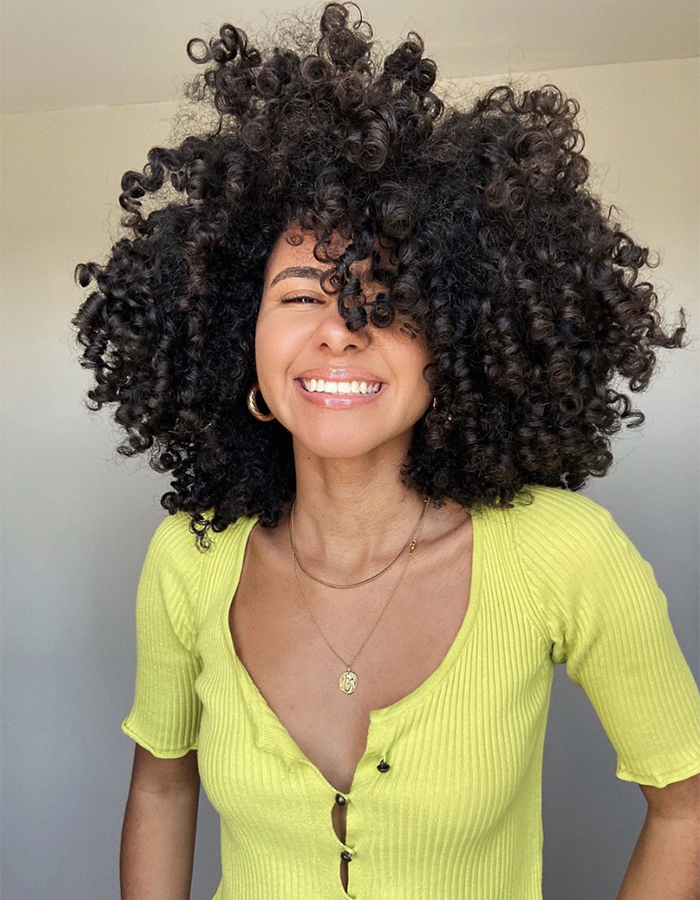
Image Source:@niathelight
Let’s explore nourishing ingredients, besides water, that can boost the hydration for healthy hair. Yes, we know that water is the greatest hydrating ingredient for hair, but remember, the primary action of moisturizing the hair is two-fold. Moisturizers support the hair’s infrastructure by replenishing internal water and other essential elements that have been lost naturally to the surrounding air and processes such as hair color, daily wear and tear, heat styling, sun exposure, etc. When your hair is damaged, it can become more porous, meaning it loses water much faster. In order for your hair to remain healthy, it needs to retain moisture and nutrients.
It also needs protection from environmental stressors, like the sun and pollution, as they cause free-radical damage, but water alone will not protect the hair. That’s why we need to incorporate these other ingredients to help keep hair nourished and hydrated.
There are certain ingredients that will help support the hair’s lipid rich outer layer by preventing moisture from escaping, thus keeping hair hydrated. Water plays an important role in providing moisture to the hair, but so do humectants, emollients, and occlusives.
Here are 7 ingredients to look for in hair care products to keep those strands hydrated. If you know that your hair does not do well with one or more of the following ingredients, then don’t use it. What works for some does not mean it works for all.
1. Honey
Honey is great at hydrating hair and is a natural humectant. What you want to look for in hair care products is hydroxypropyltrimonium honey (aka Honeyquat”> on the ingredient list — it’s an amazing conditioning agent derived from natural honey that provides many of those same honey benefits to both hair and body, like intensely hydrating humectants, nourishing antioxidants, and skin and scalp revitalizers and rebalancers – but without the sticky mess. Honeyquat is a cationic (positively charged”> quaternary polymer conditioning agent, which means it is attracted to the negatively charged hair strands (or neutral skin”>, and will absorb and cling on to the surface.
2. Coconut oil
Most natural oils sit on top of your hair, but coconut oil goes one step further. This oil has been proven to best penetrate the hair. Scientific studies have shown that coconut oil decreases protein loss, and makes your hair stronger from the inside out.
3. Avocado Oil
Avocado oil is a good source of vitamins B and E, and can be a great leave-in for hair, softening it and providing great shine. If your hair does not do well with coconut oil, then try this, as it helps to replenish strength, moisture and even shine. It also spreads quickly to coat the hair without weighing it down.
4. Olive Oil
Olive oil has been hailed as a hair-healing treatment for ages. It is very similar to the natural oils of the hair and scalp, and helps to replenish the oils that are missing in dry or damaged hair. It adds softness and strength by penetrating the hair shaft and preserving moisture.
5. Glycerin
Glycerin is a known ingredient that binds water together which means it’s instrumental in locking in moisture in addition with the other ingredients in your products. As a humectant, it attracts and retains moisture, but it works best in the right climates.
You can purcharse glycerin and add it to water in a spray bottle for instant hydration but don’t overdo it.
6. Aloe Vera
Aloe which is also known as aloe vera or aloe vera juice has great moisturizing properties. It is made up of proteolytic enzymes, which help to moisturize both the scalp and hair. It is also great for helping your hair grow and maintaining your hair’s natural sheen and luster by locking in your hair’s natural oils. Add aloe vera gel or juice to a DIY conditioning treatment, and voila.
7. Shea Butter
Shea butter is a natural carrier of vitamin A and E along with essential fatty acids. It has healing properties, and high content of fatty acids that help keep moisture in your hair. Hair is made of approximately 10-13% water. These water molecules are held within the intricate protein structures of the hair shaft, particularly in the cortex. The rich moisturizing properties of shea butter are due to its high fatty acid content, which includes stearic, oleic, palmitic, linoleic, and arachidic acids, and therefore makes it quite optimal for preventing water loss and even breakage. The ability of fatty acids to enter the hair shaft allows it to replenish areas like the hydro-lipid layer and the cortex, beneath the outer cuticle layer.
What ingredient do you seek out in your products? Share with us in the comments!
